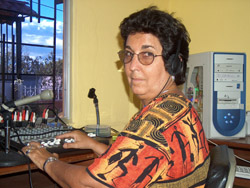 Women Rising Radio Program XII: Journalists in the Crosshairs
Women Rising Radio Program XII: Journalists in the Crosshairs
GIULIANA SGRENA: Hundreds of international journalists have been killed while doing their jobs covering global wars, and in particular in the war in Iraq. Giuliana Sgrena was almost one of thosekilled in Iraq. Born and raised in Italy, she is a journalist working for the Italian communist newspaper Il Manifesto, and for the German weekly Die Zeit. Giuliana spent her early years in a town of fewer than 1000 people, where her father Franco Sgrena had been a noted partisan during World War II. Giuliana studied in Milan and worked for Guerra e Pace, a weekly publication interested in pacifism and issues of war and peace. She went to Somalia, to Afghanistan, and to Iraq. She was awarded the Cavaliere dei Lavoro for her work on the war in Iraq. Giuliana was taken hostage in Iraq while working on a story of the destruction of Fallujah. After a month of captivity, the Italian government rescued her, but her rescue car was attackedby US forces. Nicola Calipari, an Italian diplomat, died while protecting Giuliana, and she herself was shot in her shoulder. She was permanently disabled by that experience, and deeply psychologically affected as well. Italy, her own country, not only gave up a diplomat for her. Its famous soccer team wore “Free Giuliana” t-shirts while playing internationally televised games. And Italians rose up against US military bases in Italy, saying a resounding No to US plans to double its bases there.
 MARIA SUAREZ: Maria Suarez is a Costa Rican journalist who created the Feminist International Radio Endeavor, FIRE, as a way to use Costa Rica’s air waves in the service of grassroots democracy. She works to bring the voices of women in particular to a wider audience. Maria was born and raised in Puerto Rico, a child of the cold war, and during the Cubgan missile crisis she lived right near a US military base. She realized then that the US military controlled her community in ways that she didn’t like. She decided that militarism and occupation of a country were serious problems. She wanted tohear those views on the radio, but never did. So she aimed for acareer in radio. Then she settled in Costa Rica, in order to create FIRE radio. It has gone global and been very successful. Among other issues, FIRE radio has advocated against the CAFTA agreement (Central American Free Trade Agreement). Maria has felt it would end up as with NAFTA – exploiting the people and resources of Central America, and giving nothing back. With her colleague Guadalupe Urbina Juarez, Maria has been producing Wings of a Butterfly, a multi-media theatre piece highlighting women’s invisible and undervalued contributions in disciplines as varied as physics, systems biology, mathematics, environmental science, etc. etc.
MARIA SUAREZ: Maria Suarez is a Costa Rican journalist who created the Feminist International Radio Endeavor, FIRE, as a way to use Costa Rica’s air waves in the service of grassroots democracy. She works to bring the voices of women in particular to a wider audience. Maria was born and raised in Puerto Rico, a child of the cold war, and during the Cubgan missile crisis she lived right near a US military base. She realized then that the US military controlled her community in ways that she didn’t like. She decided that militarism and occupation of a country were serious problems. She wanted tohear those views on the radio, but never did. So she aimed for acareer in radio. Then she settled in Costa Rica, in order to create FIRE radio. It has gone global and been very successful. Among other issues, FIRE radio has advocated against the CAFTA agreement (Central American Free Trade Agreement). Maria has felt it would end up as with NAFTA – exploiting the people and resources of Central America, and giving nothing back. With her colleague Guadalupe Urbina Juarez, Maria has been producing Wings of a Butterfly, a multi-media theatre piece highlighting women’s invisible and undervalued contributions in disciplines as varied as physics, systems biology, mathematics, environmental science, etc. etc.
 SARAH OLSON: Sarah was born and raised in New Hampshire, and studied at Simmons College in Boston. As an independent US journalist she began her career reporting for San Francisco’s FM station Liberation Radio. She went on to work with the Nationsl Radio Project (Women Rising Radio’s co-producer), Pacifica Radio, National Public Radio, and Free Speech Radio. She’s also written for internet news and public affairs. Sarah focused on the ongoing US anti-war movement in the Bay Area. She had done profile work about some of the conscientious objectors in the military – and so she was asked to interview a young officer in the army who was against the war in Iraq. The young officer was Lieutenant Ehren Watada, the highest ranking US military officer to refuse to deploy to Iraq. He was intelligent and articulate, he cited international, domestic and military law. And he said he wanted to help bring an end to the Iraq war. Sarah scooped the very first interview with Lt. Watada. And Lt. Watada refused to deploy to Iraq. He was confined to base in Washington state, and the army subpoenaed Sarah to testify in his case. He was facing 6 to 8 years in prison. On those grounds, and on the grounds that the military was interfering with freedom of the press, Sarah marshalled the forces of the alternative news community, and forced the military to back down – and dismiss her from the case. Says Sarah: “It’s a journalist’s job to report the news, not to participate in these political prosecutions..”
SARAH OLSON: Sarah was born and raised in New Hampshire, and studied at Simmons College in Boston. As an independent US journalist she began her career reporting for San Francisco’s FM station Liberation Radio. She went on to work with the Nationsl Radio Project (Women Rising Radio’s co-producer), Pacifica Radio, National Public Radio, and Free Speech Radio. She’s also written for internet news and public affairs. Sarah focused on the ongoing US anti-war movement in the Bay Area. She had done profile work about some of the conscientious objectors in the military – and so she was asked to interview a young officer in the army who was against the war in Iraq. The young officer was Lieutenant Ehren Watada, the highest ranking US military officer to refuse to deploy to Iraq. He was intelligent and articulate, he cited international, domestic and military law. And he said he wanted to help bring an end to the Iraq war. Sarah scooped the very first interview with Lt. Watada. And Lt. Watada refused to deploy to Iraq. He was confined to base in Washington state, and the army subpoenaed Sarah to testify in his case. He was facing 6 to 8 years in prison. On those grounds, and on the grounds that the military was interfering with freedom of the press, Sarah marshalled the forces of the alternative news community, and forced the military to back down – and dismiss her from the case. Says Sarah: “It’s a journalist’s job to report the news, not to participate in these political prosecutions..”

